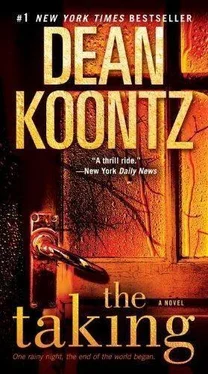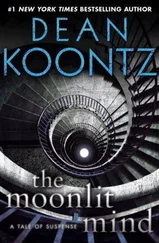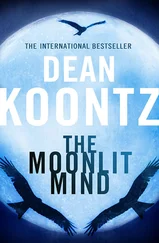She didn't know where she was going, other than to town, or why, other than to seek sanctuary with neighbors. She had always planned her life not a month ahead, not even just a year ahead, but a decade or more in advance, setting goals and striving ever toward them. Now she was unable to see as far as the coming dawn, and without a clear purpose, without a long-term plan, she felt adrift.
She wanted to survive, of course. But survival had never before been enough for her, and it wasn't enough now. To be motivated, she needed a more profound purpose and greater meaning.
Pages crystallizing into chapters, chapters accreting into books: The story-painting, spell-casting, truth-telling work of a novelist had seemed to be a lifelong purpose. Her mother had taught her that talent is a gift from God, that a writer has a sacred obligation to her Creator to explore the gift with energy and diligence, to polish it, to use it to brighten the landscape of her readers' hearts.
In her haste to pack food, weapons, and other essentials for whatever perilous journey might be ahead of them, Molly had forgotten to bring her laptop. She had always written on a computer; she didn't know if her talent would flow as easily, or at all, from the point of a pen.
Besides, she had brought no pen, no pencil. She hadn't included any paper in her provisions, either, only the pages of her current, unfinished manuscript.
Perhaps purpose and meaning and ambitious plans would elude her until she better understood the current situation and, based on more hard facts than she now possessed, could begin to imagine what future might await them.
If understanding was to be achieved, questions needed to be answered.
Although driving at only ten miles per hour through the dismal downpour, she didn't look away from the road when she said to Neil, "Why T. S. Eliot?"
"What do you mean?"
"What Harry
the thing that used to be Harry
what it said to me. 'I think we are in rats' alley, Where the dead men lost their bones.' "
"Eliot is one of your favorites, right? Probably Harry would know that."
"Harry's body was there in the hall when he spoke to me, but his brains were in the bathroom, all the memories blown out of them."
Literally riding shotgun and wary of the night, Neil offered neither an explanation nor even a supposition.
Molly pressed: "How would your alien parasite have tapped the contents of Harry's mind if Harry didn't have a mind anymore?"
Scattered across the roadway were more fallen birds. Although they were clearly dead, she tried her best to drive around rather than over them.
Grimly, she wondered how soon she would encounter human cadavers heaped in similar numbers.
"Some sci-fi writer," Neil said at last, "I think it was Arthur C. Clarke, suggested that an extraterrestrial species, hundreds or thousands of years more advanced than us, would possess technology that would appear to us to be not the result of applied science but entirely supernatural, pure magic."
"In this case, black magic," she said. "Evil. What practical purpose could they have for turning a dead man into a marionette-except to terrorize?"
Ahead in the luminous storm, a separate light arose, and grew brighter as they approached it.
Molly slowed further, allowed the SUV to coast forward.
Out of the torrents loomed a blue Infiniti, standing in their lane, facing the same direction that they were traveling, but dead still. The lights of the car blazed. Three of its four doors hung open wide.
Molly rolled to a stop ten feet behind the vehicle. The engine was running: Pale exhaust vapor issued continuously from the car's tailpipe, but the skeins of rain washed the plume away before it could attain much length.
From this angle, Molly could see no driver, no passengers.
"Keep moving," Neil encouraged.
She swung the Explorer into the northbound lane and slowly drove around the Infiniti.
No one, either dead or alive, was slumped inside below the level of the windows.
The car had not failed its occupants, yet they had abandoned it and had chosen to continue on foot. Or had fled in panic. Or had been taken.
On the pavement in front of the Infiniti, illuminated by its headlights, lay three objects. A baseball bat. A butcher knife. A long-handled ax.
"Maybe they didn't have guns," Neil said, expressing Molly's very thoughts, "and had to arm themselves with whatever they could find."
During the confrontation that occurred here, the occupants of the Infiniti must have discovered that their weapons were useless and must have discarded them. Or perhaps they had been forcibly disarmed by something that was unimpressed by clubs and blades.
"Maybe we'll meet up with them somewhere on the road ahead," Neil suggested.
Molly didn't think that would happen. Those people were gone forever: to where, unknown; to what hideous end, unguessable.
AS THE ABANDONED INFINITI'S HEADLIGHTS FADED into the rain behind them, Neil switched on the radio, perhaps to forestall further disturbing speculation about the missing occupants of that car. The fate of those travelers might be the fate of all who ventured into the storm, in which case no credible argument could be advanced for continuing to town.
Across the FM and AM bands, quarrels of static and electronic screeching alternated with silences where voices and music had once crowded the airwaves. At a small number of frequencies, words coalesced out of the cacophony, a few sentences at a time.
In two instances, reporters or government spokesmen seemed to be reading official advisories. These lacked concrete facts and for the most part consisted of empty assurances.
Some guy on a station in Denver spoke directly to his wife and son, expressing his love in simple but piercing words. Obviously, he did not expect to see either of them again.
Out of some far place, through the turbulent ether of this momentous night, came music: the classic sad song "I'll Be Seeing You."
In ordinary times, those exquisitely melancholy lyrics, that melody so full of yearning, could pierce Molly's heart. In these extraordinary circumstances, this song about lost love became a surprisingly poignant metaphor for the greater loss of an entire society, a civilization, for the sudden end of peace and hope and promise.
Throughout her lifetime, the world had been shrinking, made ever smaller by television, by satellite communications, by the Internet. Now, in mere hours, all those bonds had been cut, and the compressed world had expanded to the size that it had been more than a century ago.
The man speaking to his wife and son in Denver had sounded as if he were broadcasting from another continent. And now this song, written just prior to World War II and resonant with the uncertainties of that troubled age, brought with it through the night a quality of distance, as if it had been broadcast not merely from faraway Europe but from the Europe of another era, traveling across both half a world and more than half a century.
Tears blurred Molly's vision.
Her sense of loss, sharpened by every note of the song, grew painful, a knife of emotion twisting in her breast. Yet she remained loath to ask Neil to switch off the radio and thereby deprive them of this tenuous connection to a civilization that seemed to be dissolving rapidly around them in the caustic waters of the preternatural storm.
Either aware of her reaction to the song or sharing it, Neil pushed the SCAN button, searching for another station.
After squawk, squall, and too many frequencies marked by ominous silence, the radio pulled in a clear voice. A disc jockey, a talk-show host, a newsman: Whoever he was, whatever he was, he sounded angry and scared.
He was obsessing about audio transmissions from the crew of the International Space Station high in orbit above Earth, messages that had been sent early in the night, simultaneously with the appearance of the gigantic waterspouts on the planet's oceans. "I've played this ten times before, and I'll play it ten times more, a hundred times, hell, I'll play it until we lose power and can't broadcast anymore, until something breaks down the door and just kills us all. Listen to this, America, listen close and hard to this, and know your enemy. This is not global warming, sunspots, cosmic radiation, this is not some inexplicable spasm in the planet's climate. This is the war of the worlds."
Читать дальше
Конец ознакомительного отрывка
Купить книгу










